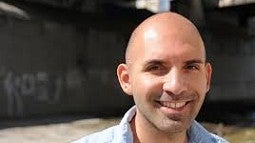
There is remarkable variation in the class: Arroyo lists public art, studies of energy use, incorporating local farms, bee walks and paths, wayfinding, lending libraries, revitalizing local churches and parklets, and small-scale urban design as just some of the projects students are working on.
“I admire the thoughtfulness of students here,” says Arroyo. “They seem very passionate about making a difference.”
Hired in 2018, Arroyo researches spatial dynamics and transnational processes of Latinx migration into suburban areas. Professor Arroyo spent last year completing the Andrew W. Mellon Foundation Fellowship in Latino Studies at the School of Advanced Research in Santa Fe, New Mexico. Through this fellowship, Arroyo began work on his first book, Shadow Suburbanism: Mexican Everyday Life, Fear, and Space in Greater Atlanta. The book illustrates how Mexican immigrants reshape their suburban environments in the face of anti-immigration policies and rhetoric.
In general, Arroyo is interested in how small-scale policies influence changes in the built environment. Such policies include anti-immigration housing policy and regulations about language and signage. Arroyo studies how immigrants adapt to these changes and influence their built environment in turn. Professor Arroyo brings these important perspectives to the Green Cities class.
Professor Arroyo is enthusiastic to be at the University of Oregon, especially due to the value placed on interdisciplinary work. He points to “the university’s emphasis on service to smaller towns,” through programs like RARE, IPRE, and SCYP.
“Planning is often such an urban-focused area of study,” says Arroyo. “It’s refreshing to be in a place that celebrates non-urban regions.”
Arroyo’s class is sure to contribute to the university’s goal of serving communities of all shapes, sizes, and backgrounds. And by placing diversity at the forefront of his class, Professor Arroyo is changing the way students think about planning and environmentalism. Through their direct engagement, students will help to create a more equitable and sustainable future for the communities along River Road.
